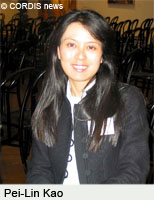Intel provides holistic model for gender equality
Participants at the two-day conference on 'Re-searching Women in Science and Technology' in Vienna on 15 and 16 May, were granted an insight into some of the best practices in gender equality and inclusion undertaken by companies with significant research and development (R&D) interests. Strategies varied from those that aimed to tackle recruitment, to salary parity and initiatives that facilitated a better work-life balance and provided women the opportunity to develop within the company. CORDIS News spoke to the representative of one these companies, which has shown to have successfully incorporated many, if not all these approaches into its core business strategy. Pei-Lin Kao is responsible for human resources development at the Irish site of Intel, a global manufacturer of computer, networking and communications products. 'The diversity initiative which we have developed here is not something new in our company,' Ms Kao told CORDIS News. 'It is based on Intel's long established commitment to developing leadership and diversity policies, of which gender is a part.' Such commitment, Ms Kao believes, is the driving factor behind her company's economic performance. 'By promoting a better and more equitable environment for all its employees, Intel retains the best people and gives them the support to grow and productively use their individual insights and talents to increase our leadership across the industry worldwide,' she said in her presentation to participants at the conference. Intel's career development strategy for women mirrors an employee's life cycle at the company, starting at the recruitment process where efforts are made to understand the market availability for female employees. These include employing external organisations to conduct comprehensive surveys on the numbers of women applying to study educational disciplines related to the company's industry, and the number who successfully get onto the courses and graduate. 'We also maintain a close network with selected companies to understand their hiring needs, headcount and availability of experienced candidates.' explained Ms Kao. 'The information provides us with the understanding of the market availability of both female graduates (inexperienced) and experienced candidates already in the workforce.' But it is not enough just to understand the market, said Ms Kao, Intel goes one step further by trying to influence it. For instance, when data from the colleges in Ireland suggested that the numbers of women entering technical/science courses were extremely low, Intel decided to develop a special scholarship initiative targeting young, school-leaving girls, to encourage them to continue with science subjects in school, and to then go on to technical courses at the next level. Also, in cooperation with other companies, it started the 'Career days for future female engineers', which target university students, offering them an opportunity to speak with company representatives about their career prospects and a chance to be selected for a summer internship at Intel. School-leavers are also encouraged to attend in order to get a taste of specific scientific and technical studies. When it comes to recruitment, the company takes into consider a number of factors, one of which is gender representation. 'We regularly monitor parity of female hiring to market availability. Currently, Intel Ireland female engineers' hiring is above market availability, which reflects the company's goal of ensuring parity in this area of diversity,' Ms Kao told CORDIS News. Once recruited, the company continues to monitor the ratio of men to women by grades, and measures pay parity for women and men according to grade, age, background, time of service, time spent in a particular grade, among other factors. The company also uses what it refers to as 'pulsing mechanisms' - informal sessions with employees, as well as more formal organisational health surveys, in order to measure employee satisfaction and identify perhaps signs of discrimination or unusual practices. Although rigorous, Ms Kao believes that the company's diversity strategies are not intrusive 'We don't aim to be do an 'in-your-face' diversity scheme, instead we try to be subtle and work behind the scenes,' she said. In terms of possible career development opportunities for women, Ms Kao referred to the company's mentoring programme in which senior managers are required to mentor female managers and senior individual contributors. The aim here is to improve retention through individualised mentor relationships and create a higher level of visibility and advocacy for women and under represented minorities, she explained. The company also offers other training opportunities through in-house courses at the Intel University. In recognition of the difficulties involved in reconciling home and work life, the company also provides a number of 'family-friendly' solutions, including time flexibility options, alternative working methods such as teleworking, and on-site services including massage therapy, a shop, dry-cleaners, canteen, and sports facilities. In addition, the company organises on-site seminars run by local experts on family issues such as 'coping with teenagers and children' and 'financial independence'. With such a wide and extensive range of methods and solutions to enhancing the work environment dealing with gender and diversity, it is perhaps no surprise to learn that in 2003, Intel Ireland was selected by Fortune magazine as one of the top ten 'Great Companies to Work For' in Europe. It also was the recipient of the EU Diversity Award, presented by then European Commissioner for Employment and Social Affairs Anna Diamantopoulou. Asked about the value of participating with other companies in initiatives such as 'Women in Science and Technology' (WIST), Ms Kao told CORDIS News that the experience of sharing best practices was a very useful one: 'When we look at our short-term strategies for diversity, we get a lot of the elements from fora like these [WIST] which we then incorporate into our programmes.'



